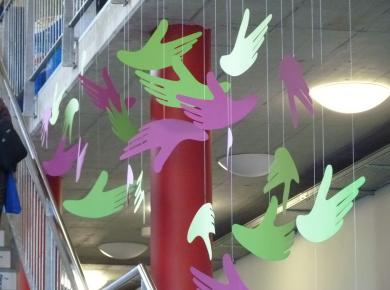Posted: September 3, 2012
Sumiswald, Switzerland – Every six years, Mennonites in Europe gather for their regional assembly known as the Mennonite European Regional Conference (MERK). This year’s meeting, held from May 17 to 20, preceded the meetings of the Mennonite World Conference (MWC) General Council at the Chrischona Centre near Basel.
MERK drew a total of 855 people to a recreational complex in Sumiswald, Switzerland, in the heart of the Emmental region where Anabaptists have had a long and durable history. Most participants were from the Netherlands, Germany, France, Switzerland, and Spain, but the group included delegates from smaller European conferences and visitors from the MWC General Council and Commissions, some 36 countries were represented.
“Borders—they are everywhere around us and in us,” observed Louise Nussbaumer, president of the French association of MWC (Association française Conférence Mennonite Mondiale) and former MWC Executive Committee member. “It is argued that they protect us; in fact, they isolate us and leave us alone and poor. Social, political, ethnic or cultural boundaries block relationships.” The gathering included plenary addresses by European leaders Lukas Amstutz and Ruth Raab-Zerger of Germany, and Philippe Gonzalez of France.
The participants were often reminded that to reach out is an act. Many personal stories from Europe and beyond punctuated the plenary meetings. Some were spectacular, but all bore witness to the faithfulness of God when people were ready to reach out their hands. The morning Bible studies by Anne-Cathy Gerber of France and Jeanet van Woerden of Germany explored the subthemes “Because God Provides an opening” (on the Samaritan woman at the well, John 4) and “Because God gives a chance to each one” (the woman caught in adultery, John 8) respectively.
Afternoon workshops related to the theme were well attended. Activities were also offered for children, youth and young adults. More than 250 volunteers helped at every level and contributed to the conference’s organization.
Esther Braun of Langnau, who provided crucial administrative support in the months leading up to the conference summed up the theme well: “More and more I am aware, personally, that in order to reach hands across borders, one has to let go. One has to be detached from one’s expectations, prejudices, and fears. One has to avoid jumping to interpretation or being rigid in one’s beliefs that one’s own way has to be right. When—with God’s help—we are free in this way, other barriers (religious, cultural or linguistic) will not seem so impenetrable and scary.”
During the gathering one could experience firsthand the opportunity to reach out to the other—to the one who was there for the first time, the one whose language one did not understand and whose story one had to discover. And one could also reach out to receive a word of encouragement or exhortation, a story of forgiveness or of new beginnings.
In order for hands to be truly extended, the Mennonite Mission Services of the Swiss Mennonite church sponsored an aid project for the marginalized Roma people of Serbia and Albania. It was on opportunity to learn to cross borders of prejudice with regard to the Romas, and to help break the cycle of poverty. Each participant at MERK had been asked to bring knitted socks, underwear, school kits, and emergency health supplies. And they responded; they brought 190 school kits, filled 54 pails with emergency health supplies and knit more than 500 pairs of socks. A truck was hired to deliver the items to Christian organizations that will take care of the distribution.
For Mari Friesen, each pail was like a seed that can bring forth fruit. Mathias Hofer remembers how one elderly woman came, bright-eyed, with 20 pairs of socks that she had knit. “Finally,” she said, “there is something I can do with my hands, and I do it with all my heart.”
As Louise Nussbaumer said, “Hands reaching across borders [is also] to recognize invisible, never-named borders in our lives, and find the courage to cross them.”
From reports by Elisabeth Baecher and others, compiled by Sylvie Gudin Koehn.

Comments: